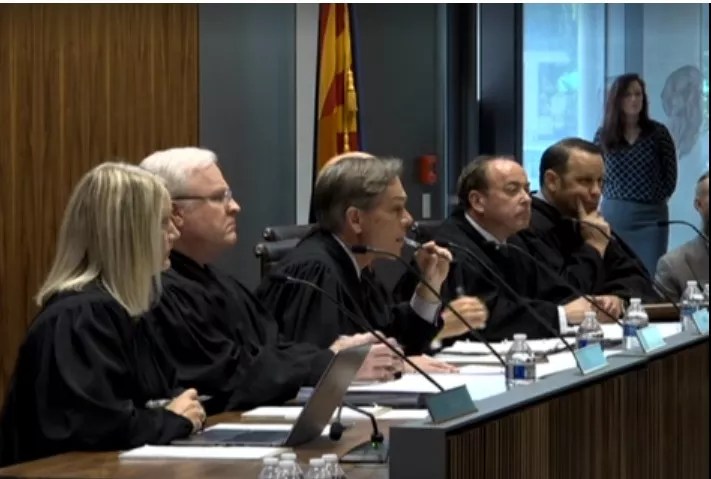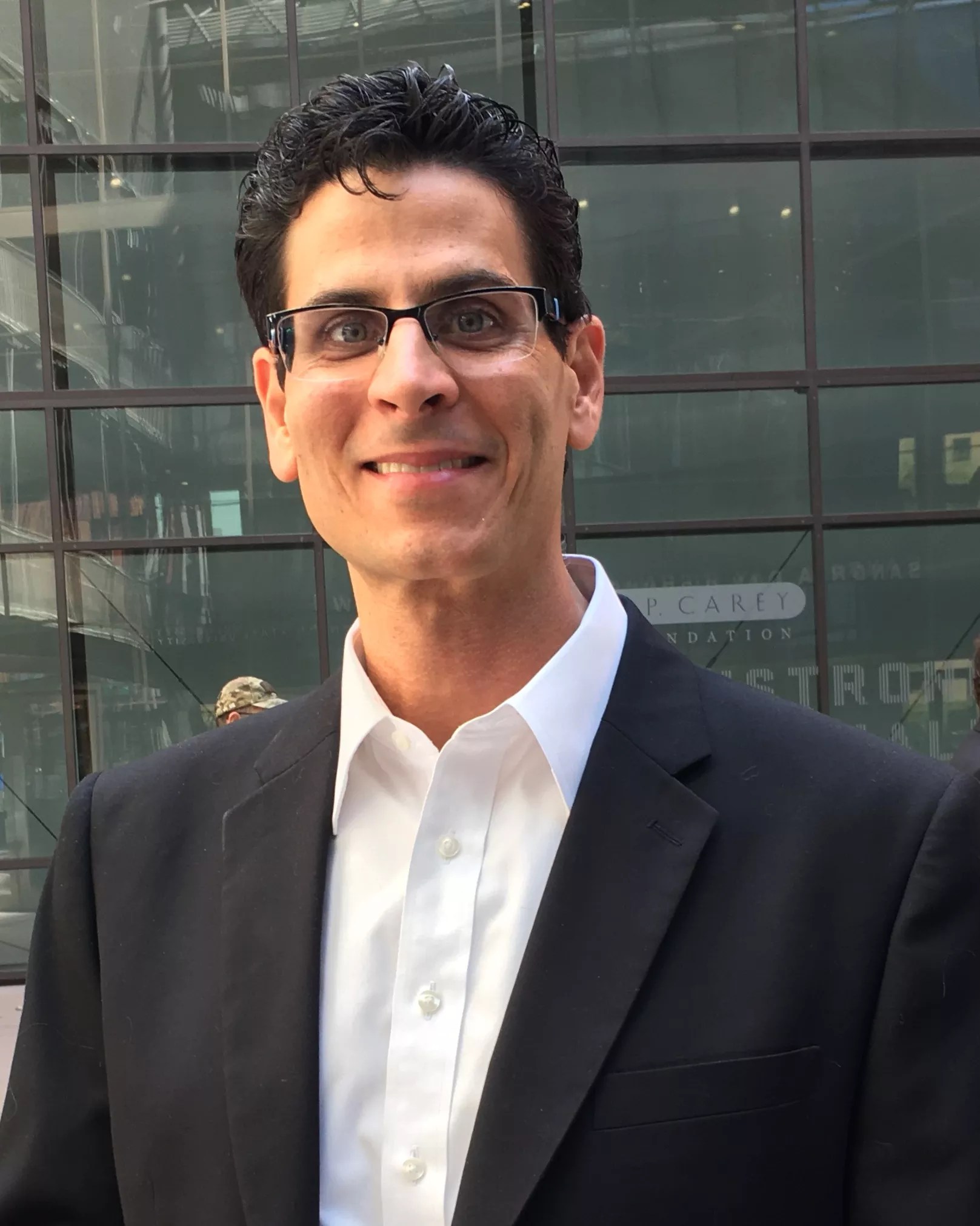
Arizona Supreme Court

Audio By Carbonatix
Several Arizona Supreme Court justices appeared to favor medical-marijuana extracts during oral arguments on Tuesday in a case that could determine the future of medical marijuana in this state.
The case, State of Arizona v. Rodney Christopher Jones, questions the scope of the 2010 Arizona Medical Marijuana Act and the issue of whether it includes products containing resin extracted from the marijuana plant.
In a packed auditorium at ASU’s Sandra Day O’Connor College of Law, each side presented divergent interpretations of what voters intended as the definition of marijuana when they enacted the medical-marijuana law via ballot initiative nine years ago. They also hashed out the finer points of how marijuana is prepared or consumed so that a patient can reap its medicinal benefits.
Through their questioning, most justices appeared to agree with the broader interpretation of the 2010 law presented by Robert Mandel, representing the petitioner, rather than the stricter interpretation offered by Benjamin Kreutzberg, representing Yavapai County, whose county attorney, Sheila Polk, is notoriously harsh on marijuana.
The 2010 law indeed covered resin, because in order for the therapeutic elements of marijuana to be accessible to a patient, resin has to be extracted from the plant one way or another, Mandel told justices.
Even in baking a pot brownie, the resin would not emerge from the flower unless baked to a certain temperature, Mandel explained in an effort to demonstrate his point. Otherwise, “you’re never going to be able to access the cannabinoids,” he said, referring to the active chemical compounds in marijuana.
“Now I know exactly how to do this,” Justice Ann A. Scott Timmer responded jokingly, eliciting laughter from the audience. Then, Timmer grew serious. If there was no way to obtain marijuana’s therapeutic effects without extracting the resin, some way or another, “does that in itself suggest that necessarily the voters must have been contemplating the use of resin?” she asked.
“We have to assume that the voters understood that what they were immunizing people [from prosecution] to use were things that were actually going to be medicinally valuable,” Mandel replied.
Much of the case hinges on how marijuana is defined. The 2010 Arizona Medical Marijuana Act defines “marijuana” as “all parts of any plant of the genus cannabis whether growing or not, and the seeds of such plant.” It defines “usable marijuana” as “the dried flowers of the marijuana plant, and any mixture or preparation thereof, but does not include the seeds, stalks and roots of the plant.”
The difference matters. The definition of “usable marijuana” applies only in calculating how much marijuana a cardholding patient receives will count toward their biweekly quota of 2.5 ounces. Otherwise, the 2010 law gives immunity to registered patients who possess “an amount of marijuana that does not exceed the allowable amount.”
Arizona criminal code, however, defines marijuana and cannabis differently – and under this law, resin and marijuana extracts are considered cannabis, not marijuana.
Several justices seemed to appreciate Mandel’s argument. For the medical-marijuana law not to cover resin would be “irrational,” Chief Justice Scott Bales said, because it would force patients to obtain the therapeutic effects of marijuana in the least effective way possible.

Robert Mandel
Elizabeth Whitman/Phoenix New Times
In his argument, Kreutzberg, countered that idea. When they enacted the 2010 law, voters knew that Arizona criminal code defined cannabis and marijuana differently. Any leafy marijuana that you put in a bowl or roll in a joint and smoke is considered marijuana. But any resin extracted from the plant and then used in another product, like edibles, shatter, wax, or hash, counts as cannabis.
Given those differences, voters knew that resin would not be covered under the Medical Marijuana Act, Kreutzberg told justices.
They didn’t buy it.
“I’m trying to figure out how you know that the people of Arizona knew that,” said Justice John Pelander, who retired March 1 but was brought back for this case.
Bales told Kreutzberg that it was “hard for me to see” how he could claim that voters enacted a more narrow definition of marijuana under the 2010 law when the law itself clearly had a broader definition. Timmer, too, implied that it wouldn’t make sense for voters to approve of a law that effectively barred patients from accessing the very substance that was supposed to help them.
Nevertheless, Polk’s attorney maintained that patients could derive benefits from marijuana without resin extraction.
“It is possible to make brownies or other edibles just using ground-up plant material,” Kreutzberg said in response to a question from Timmer. “It can be done.”
After the hearing, Mandel said he was “gratified” that the justices had clearly taken the time to understand the complexity of the issue at hand, and that Yavapai County had been making arguments “devoid from the reality of the marijuana plant’s anatomy.”
If the court rules in favor of the state, in this case Yavapai County, it would essentially give patients one option for getting marijuana: smoking, said Jared Keenan, a criminal justice attorney with the American Civil Liberties Union of Arizona, which filed an amicus brief supporting the petitioner.
It was unlikely that voters intended for children who are medical marijuana patients to get their CBD and THC that way, Keenan said after the hearing. “It just seems crazy that the voters would say, we only want a 3-year-old to smoke a joint,” he said.
Keenan was pleased that the justices seemed to understand the finer points of the science behind marijuana extracts. But although he thought Mandel argued well, while Kreutzberg seemed unable to answer some of the justices’ questions, “it really could go either way,” Keenan added, referring to the Supreme Court’s final decision.
Tim Sultan, the executive director of the Arizona Dispensaries Association, an industry group for the state’s cannabis industry that filed an amicus brief on behalf of the petitioner, said he was “very optimistic” about the case, after listening to the justices.
“It’s personal for so many of us,” he said of the case. “Rodney Jones spent two and a half years in jail. That could’ve been me.”
Rodney Jones, the plaintiff in the case, is a certified medical-marijuana patient who was arrested in 2013 in Yavapai County for possessing less than a gram and a half of hashish – “a thimble’s worth of extract,” his lawyers noted poetically in petitioning the Supreme Court to review the case.

Tim Sultan
Elizabeth Whitman/Phoenix New Times
He was prosecuted in Yavapai County, whose attorney Polk has compared medical marijuana to explosives. Jones was subsequently convicted for possession of narcotics and drug paraphernalia under Arizona’s criminal code.
After serving two years in prison, Jones appealed his case. Last June, the Arizona Court of Appeals upheld his conviction 2-1, ruling that the 2010 Arizona Medical Marijuana Act did not apply to the resin extracted from marijuana plants, nor any products that contain it.
The decision created anxiety for both the medical marijuana industry and the patients who rely on those products. The 2010 law defines marijuana as “all parts of any plant of the genus cannabis .. .and the seeds of such plant,” but Arizona criminal law considers resin to be separate from marijuana.
In a separate, 2013 lawsuit, Maricopa County Superior Court Judge Katherine Cooper ruled that Arizona’s medical-marijuana law did apply to resin, but the decision did not cover the entire state of Arizona.
About 174,000 people in Arizona hold medical-marijuana cards. The Supreme Court typically issues decisions in two or three months.
If the Supreme Court upholds the lower court’s decision, such a ruling could upend the Arizona’s medical marijuana industry. People or businesses who use or sell hashish and other marijuana resin concentrates would be subject to the same felony prosecution that Jones was, and perhaps young medical marijuana patients would find themselves with no way to get relief except by smoking a blunt.